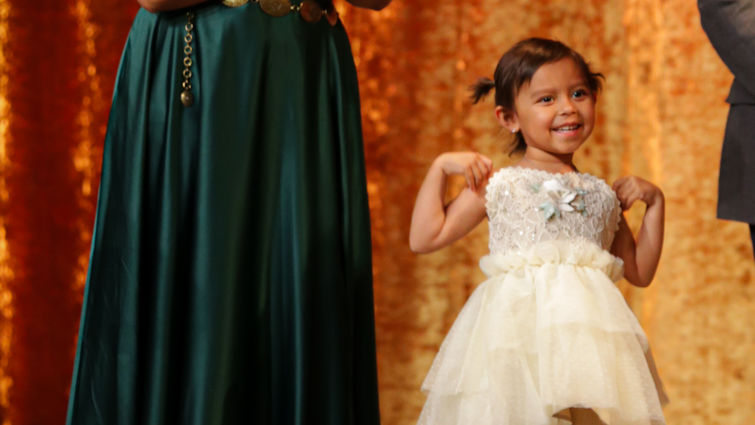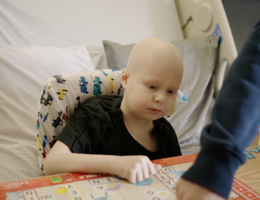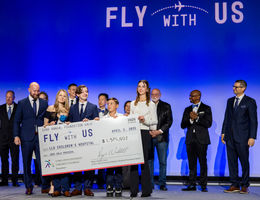

Oakley was honored and celebrated on stage at the 31st annual Foundation Gala on April 4, 2024.
Oakley was honored and celebrated on stage at the 31st annual Foundation Gala on April 4, 2024.
At just six weeks old, Oakley Quinonez, born with a deep love for the outdoors, embarked on a journey into the world of mountains, fishing spots, and off-road terrains. Described by her mother, Crystal Quinonez, as a "girly girl with a tutu," Oakley fearlessly interacted with wildlife, picking up lizards and bugs.
"She is a light to everyone she meets. She's the happiest child you could ever meet," said Crystal.
In September 2022, their lives took an unexpected turn when what appeared to be a common cold turned out to be acute lymphoblastic leukemia (ALL), a type of cancer affecting white blood cells in the blood and bone marrow.
"All the kids at gymnastics kept getting colds, so we were like, 'Okay, it's just a normal cold.' And then her eyes started to swell," Crystal said.
Oakley's diagnosis came from Latika Puri, MBBS, a pediatric hematologist-oncologist at Loma Linda University Children's Hospital. For Oakley and most patients with ALL, treatment typically spans two and a half to three years. It includes chemotherapy, steroids, and lumbar punctures with administration of chemotherapy in the spinal canal. Overall the treatment has several challenges such as lethargy, loss of appetite, leg pain causing difficulty in standing, increased risk of infection, need for frequent blood transfusions, mood changes, and hair loss.
Crystal shared, "I think the hardest thing for her was the hair loss because we would brush her hair every morning, and it was like, 'Oh, your pretty hair, let's get your pretty hair ready.' And after it started falling out, she was like, 'Oh, I'm not pretty anymore. I don't have my pretty hair anymore.'”
During Oakley's hospital stay, Samantha Stewart, a child life specialist, offered invaluable support and encouragement to the family. Stewart explained her role, saying, "My goal with being a child life specialist is to help kids know that doctors aren't scary, they're not trying to be mean people, they're doing what they can to make sure your body stays as healthy as possible.”
Stewart elaborated on their approach, stating, "We try to provide Barbie dolls that look similar to our patients. There are Barbie dolls without hair, and we want our girls to know that it's their personality, their sparkling smile, and Oakley's ability to be a spitfire and so sweet all at the same time that makes her beautiful. Providing that Barbie so she could see if Barbie's still beautiful, then so am I."
For Oakley, the initial intensive phase, lasting about 10 months, mainly occurred in the outpatient setting, with occasional hospital admissions for rigorous chemotherapy. Oakley’s treatment also included Blinatumomab, a treatment very different from regular chemotherapy. Blinatumomab is a monoclonal antibody that targets a protein on leukemia cells called CD19, allowing the immune system to recognize and attack the cells. As the first year concluded, Oakley's treatment transitioned to a less intensive phase, now managed with oral chemotherapy.
"After nine to 10 months of intensive treatment, acute lymphoblastic leukemia patients are seen in the clinic anywhere between once a month and maybe once a week, depending on how they're doing," said Puri. “They're slowly returning to normal. They start going to school, start to feel better overall, and become more active and energetic. They can also go places they've been restricted to before, like the store, mall, or park."
Oakley's hair has now grown back, signifying a return to normalcy for her and her family. The family has been taking her on fishing trips and hikes again. She was recently enrolled in a ballet, tap, and hip-hop class.
"Whenever we're in the store, and she hears a song she likes, she will shake her little booty in the aisle. There's nothing that could stop her. She goes to her dance class; she says, 'Hi, I'm Oakley, and I'm here to dance,'" said Crystal.
Acute Lymphoblastic leukemia is one of the most common diagnoses in pediatric cancer. About 80% to 90% of children with acute lymphoblastic leukemia are cured, according to the National Institutes of Health.
The pediatric hematology/oncology team at Loma Linda University Children’s Hospital provides compassionate and comprehensive care for children with cancer and blood disorders, such as leukemia, lymphoma, sarcomas, brain tumor sickle cell disease, hemophilia etc. Children receive highly specialized care in a dedicated unit with support services designed to help kids and families facing these complex childhood disorders. For more information, visit online.


